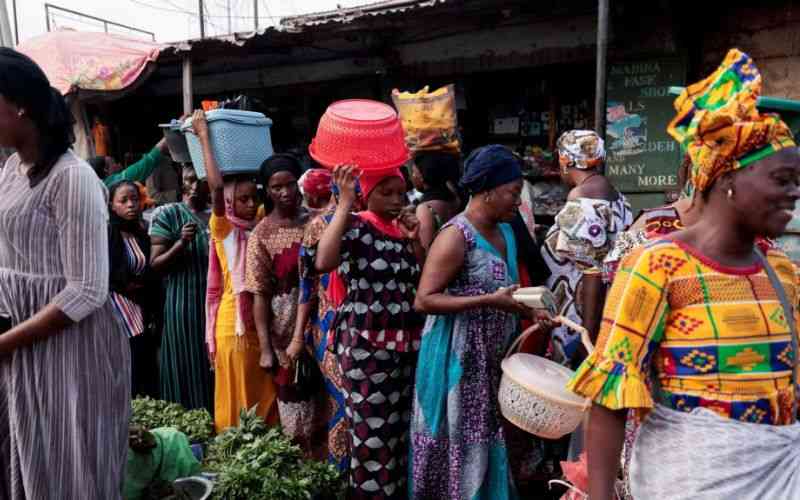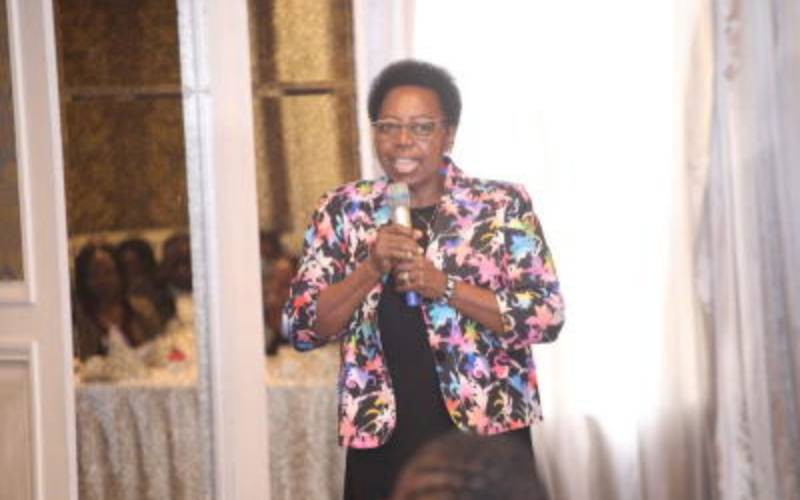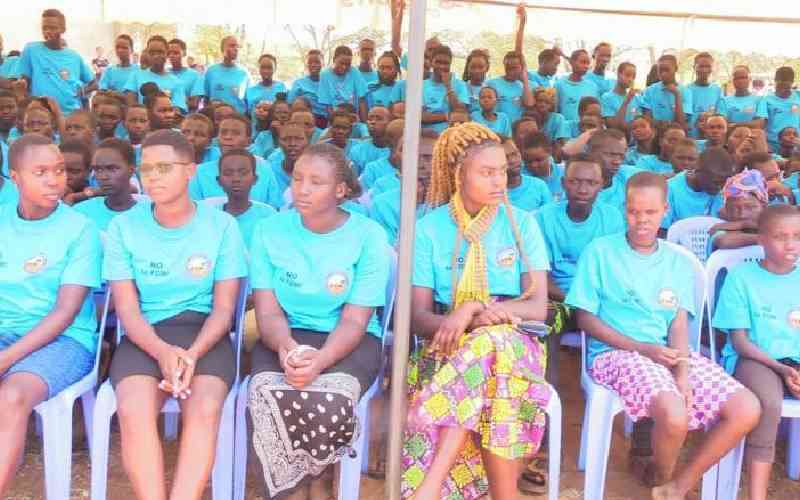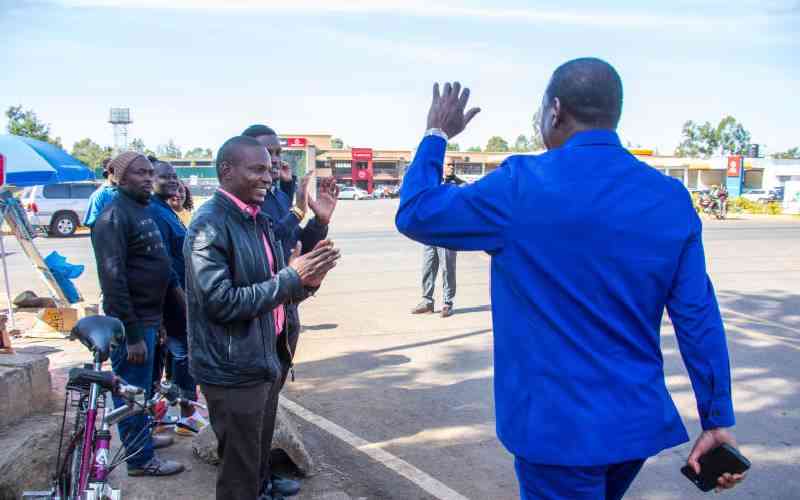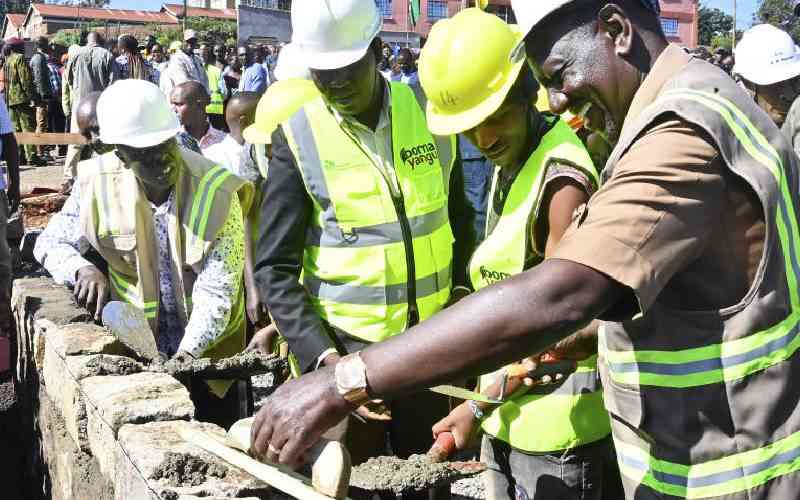By CAROLINE NYANGA
She was only 17 when she had her genitals cut at the hands of an elderly neighbour. But Evelyne Cheruto, now 28, still remembers the toothless smile of the government official who should have prevented it from happening. Instead he stood by, waiting outside the homestead for her and 12 other girls to undergo the traditional ritual, even though he knew it was illegal.
The chief respected the traditional law that disallowed men from treaspassing inside the ring of mud huts during the ceremony. But he had no misgivings about condoning a crime against the country’s secular laws that was about to take place. Or the gross violation of human rights—a violent act against a helpless child.
Cheruto was physically and mentally scarred from the infibulation — a procedure that involved removing tissue deep inside her body, and one that would make passing urine painful for the rest of her life.
The sharp knife reflected the chill of the dawn as it was six O’clock in the morning.
All around were smiles and hushed laughter.
There were also expectations. The main focus for most of the people standing in and around the boma was to get it over and done with, but not out of sympathy for the teenage Cheruto. They were waiting for the party and merriment later in the day that accompanied such ceremonies.
A Standard Six drop out from Kokworitit Primary in Lumut Village, Cheruto had no idea what would befall her after the so-called right of initiation into womanhood.
The procedure left her badly injured. And although she was lucky to get pregnant with her then boyfriend, Cheruto found herself in labour for three days — something that cost her baby’s life.
For three years now, Cheruto has a problem of uncontrolled passage of urine despite undergoing a series of treatment prescribed at various local hospitals.
But the saddest part of it all is that Cheruto may not be able to have babies or sex for the rest of her life.
“It’s a nightmare for me having to live with the pain that I can no longer carry on with my duties as a woman. Let alone getting a man to marry me,” she says, tears rolling down her cheeks.
Today, her advice to fellow Pokot women is to shun the despicable practice of Female Genital Mutilation if they hope to lead a fulfilling life.
“Although there are people out there who were lucky to survive the ordeal and move on with their lives, I was not that fortunate. And as a result today, I have no future due to the malpractices by my community that are against the law,” she says.
Unlike Cheruto, 32-year-old Damaris Kaperur was lucky to escape the ordeal.
Stay informed. Subscribe to our newsletter
“I was born and brought up in an urban environment within Kapenguria where I went to school then studied biblical teachings that paved the way for my future,” says Damaris, now married with a child.
Like Cheruto, her advice to Pokot women is to reject the illicit practice of FGM.
“You can have normal healthy babies and be loved by your husbands without undergoing the cruel and primitive rite that has been the norm of our society,” she says.
It is now evident that the consequences are grave hence the need to move with the times,” says Damaris.
To pass her message to girls in her community, Cheruto featured in a 52-minute documentary film, Blood of Women.
Directed by French director-cum-producer Christian Lajoumard, the moving and traumatising film aims to educate and raise awareness of sexual mutilations in West Pokot.
The documentary revolves around the cruel and, some say, crude traditions women of Pokot have to undergo.
The pain and endurance of the girl-child at the hands of crude tools used on them as they undergo FGM is well captured.
The documentary has been made by the Pokots for the Pokots and shot in West Pokot . . . it shows different perspectives of a culture that has for years had severe consequences on the health and life of local women.
The subtitled film took three weeks to complete.
The editing and translation was done by a Pokot social worker who had to travel to France for that purpose.
Mainly funded by the Swiss and French governments through their embassies in Nairobi, the film has been made in two versions.
The first version is a 32-minute feature dubbed Broken Bodies while the second 52-minute episode is Blood of Women which demonostrates various accounts of Pokot traditions.
The implementation of the project has been realised through a grant allocated by the Social Fund for Development of the French Embassy.
This documentary is now a tool to make people think twice about the sanitary risks of female genital mutilations, often perpetrated in the forest with the same dirty knife for several girls.
“Mine is to relay a strong message to Kenya and the world that despite the several warnings by the Kenya government on the illegal practice that has cost many women and children their lives — it is unfortunate that it is still being carried out in areas within Kenya,” says Cheruto.
Cheruto says she has grown up in a soceity where images of 12-year-old girls married off to older men after having their genitals cut off symbolising “adulthood” are commonplace.
Because of a cultural attitude that does not value education for women, these girls are unable to continue their schooling. Instead, they are forced to drop out of school to begin their work serving the household, she says.
This situation has resulted in high levels of illiteracy among women and a complete lack of access to means of improving their economic status.
According to the World Health Organisation, more than 130 million women and girls alive have undergone female genital mutilation and each year there are more than two million new cases around the world.
Banned by the Kenyan government in 2001, it remains a strong tradition in greater Pokot.
Despite the condemnation of FGM, internationally often seen as a violation of a woman’s rights, the Pokot community have continued to embrace this ritual whose long-term physiological effects include septicaemia, genital malformation and even death.
The acts are performed by women elders, who are ‘specialists’ in the community but rarely have medical training and little or no knowledge of the risks of HIV infection.
Although the government publicly condemns the ritual, it is not specifically outlawed.
The film, Blood of Women, aims at creating awareness against the continuous torture Pokot women are subjected to when they are forced to undergo Female Genital Mutilation (FMG) and early marriage.
 The Standard Group Plc is a
multi-media organization with investments in media platforms spanning newspaper
print operations, television, radio broadcasting, digital and online services. The
Standard Group is recognized as a leading multi-media house in Kenya with a key
influence in matters of national and international interest.
The Standard Group Plc is a
multi-media organization with investments in media platforms spanning newspaper
print operations, television, radio broadcasting, digital and online services. The
Standard Group is recognized as a leading multi-media house in Kenya with a key
influence in matters of national and international interest.
 The Standard Group Plc is a
multi-media organization with investments in media platforms spanning newspaper
print operations, television, radio broadcasting, digital and online services. The
Standard Group is recognized as a leading multi-media house in Kenya with a key
influence in matters of national and international interest.
The Standard Group Plc is a
multi-media organization with investments in media platforms spanning newspaper
print operations, television, radio broadcasting, digital and online services. The
Standard Group is recognized as a leading multi-media house in Kenya with a key
influence in matters of national and international interest.

